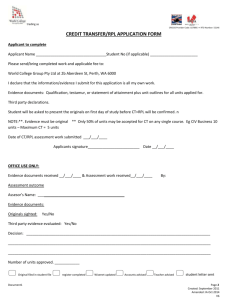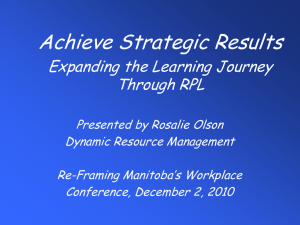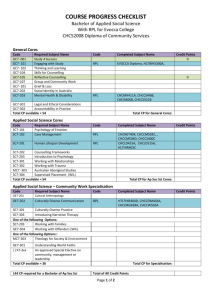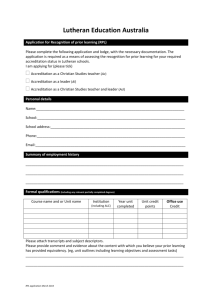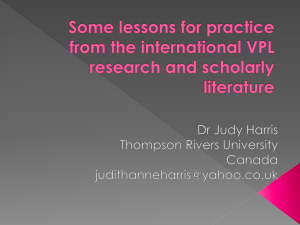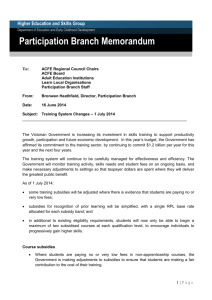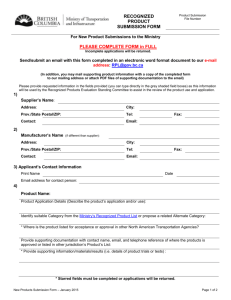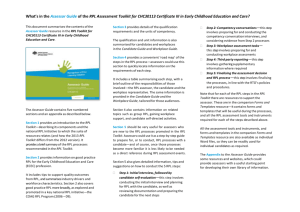Procedure - Centre for Excellence in Child and Family Welfare
advertisement
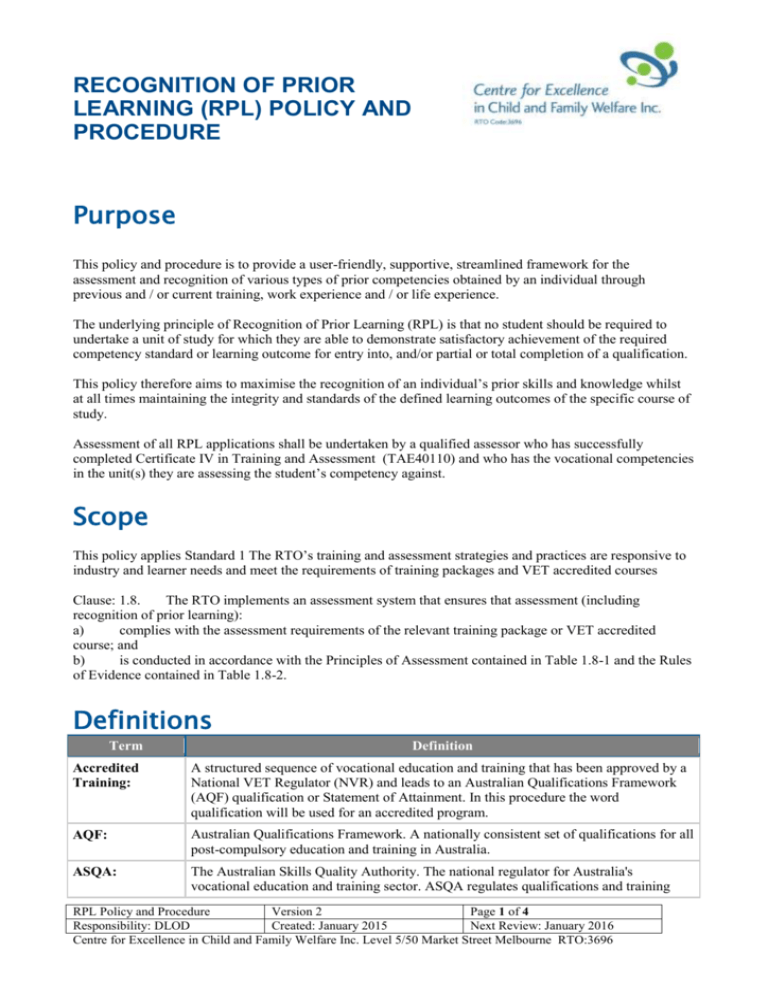
RECOGNITION OF PRIOR LEARNING (RPL) POLICY AND PROCEDURE Purpose This policy and procedure is to provide a user-friendly, supportive, streamlined framework for the assessment and recognition of various types of prior competencies obtained by an individual through previous and / or current training, work experience and / or life experience. The underlying principle of Recognition of Prior Learning (RPL) is that no student should be required to undertake a unit of study for which they are able to demonstrate satisfactory achievement of the required competency standard or learning outcome for entry into, and/or partial or total completion of a qualification. This policy therefore aims to maximise the recognition of an individual’s prior skills and knowledge whilst at all times maintaining the integrity and standards of the defined learning outcomes of the specific course of study. Assessment of all RPL applications shall be undertaken by a qualified assessor who has successfully completed Certificate IV in Training and Assessment (TAE40110) and who has the vocational competencies in the unit(s) they are assessing the student’s competency against. Scope This policy applies Standard 1 The RTO’s training and assessment strategies and practices are responsive to industry and learner needs and meet the requirements of training packages and VET accredited courses Clause: 1.8. The RTO implements an assessment system that ensures that assessment (including recognition of prior learning): a) complies with the assessment requirements of the relevant training package or VET accredited course; and b) is conducted in accordance with the Principles of Assessment contained in Table 1.8-1 and the Rules of Evidence contained in Table 1.8-2. Definitions Term Definition Accredited Training: A structured sequence of vocational education and training that has been approved by a National VET Regulator (NVR) and leads to an Australian Qualifications Framework (AQF) qualification or Statement of Attainment. In this procedure the word qualification will be used for an accredited program. AQF: Australian Qualifications Framework. A nationally consistent set of qualifications for all post-compulsory education and training in Australia. ASQA: The Australian Skills Quality Authority. The national regulator for Australia's vocational education and training sector. ASQA regulates qualifications and training RPL Policy and Procedure Version 2 Page 1 of 4 Responsibility: DLOD Created: January 2015 Next Review: January 2016 Centre for Excellence in Child and Family Welfare Inc. Level 5/50 Market Street Melbourne RTO:3696 Term Definition providers to ensure nationally approved quality standards are met. NVR Standards: Standards for National VET Regulator Registered Training Organisations. The objectives of the NVR Standards are to ensure nationally consistent, high-quality training and assessment services within Australia’s VET system. Continual compliance with the Standards is a condition for all NVR registered training organisations and for applicants seeking registration under the Act. RTO: Registered Training Organisation. A training organisation listed on the National Register, or by the relevant state based authority, as a registered training organisation. Centre for Excellence in Child and Family Welfare Inc RTO number is 3696 Scope: The Scope of Registration details the nationally recognised training that CFECFW is approved to provide. Centre for Excellence in Child and Family Welfare Inc. scope of registration can be viewed on the www.training.gov.au website. In this procedure the Scope of Registration will be referred to as "the Scope". Training Package Qualification: A nationally endorsed, integrated set of competency standards, assessment requirements, Australian Qualifications Framework qualifications, and credit arrangements for a specific industry, industry sector or enterprise. In this procedure the word qualification will be used to refer to a training package qualification. TAE40110 Certificate IV in Training and Assessment Procedure The Centre for Excellence in Child and Family Welfare (CFECFW) shall ensure that each qualification shall have a designated RPL application in place which includes a RPL Information Kit and application with relevant assessment documents that will help the candidate collect evidence to confirm their skills and knowledge. The RTO also has relevant instructions for assessors to support them in completing the RPL application. The RPL Process includes 5 stages: 1. Preparing the candidate with information on the RPL process 2. Candidate self assessment 3. Gathering of evidence and making a judgement 4. Documenting the assessment decision 5. Informing the candidate of the RPL outcome Preparing the candidate with information on the RPL process All prospective and enrolling individuals must be informed through pre-enrolment information of the opportunity to apply for RPL (Student Information Handbook & Course Brochure/ Flyer). Once a participant has confirmed they are interested in applying for RPL they must be provided the RPL Information Kit for the qualification / units they are proposing to include in their application for RPL. The RPL Information Kit is to provide the required information to students that will enable them to determine if they wish to apply for RPL and the stages of the RPL process. RPL Policy and Procedure Version 1 Page 2 of 4 Responsibility: DLOD Created: October 2014 Next Review: October 2015 Centre for Excellence in Child and Family Welfare Inc. Level 5/50 Market Street Melbourne RTO:3696 The following information is to be provided to participants within the RPL Kit: What is RPL To support an RPL application, an individual must be able to provide evidence and demonstrate that they have gained the required skills and knowledge relating to the unit of competency for which recognition is being applied for. RPL is awarded for a total unit of competency (no partial RPL of a unit of competency will be awarded) How to enter the RPL process (by completing the Application Form) The RPL process and the stages involved. This will include the details of any required skills assessment. Candidate self-assessment For Candidates that are interested in applying for RPL, they are required to complete the RPL SelfAssessment to determine if they feel that they have a strong case to apply for RPL. The RPL Self-Assessment is to be completed by the student but they may request assistance from the allocated assessor. As part of the application process the completed self-assessment will be reviewed by the allocated assessor to confirm the student has a strong case for applying for RPL. If it is determined that they do have a strong case, and will be able to provide sufficient evidence of the relevant skills and knowledge, then the RPL Application is to be completed identifying which units RPL is being applied for. Gathering of evidence and making a judgement When the candidate is ready to submit their evidence, an interview with the Assessor will be organised. They will be required to submit all their evidence and the Assessor will review the information provided and begin to match up your skills to the units/subjects in the qualification. This interview helps the Assessor confirm the authenticity and validity of the evidence. The Assessor will document the interview in a Report which will also form part of the RPL evidence. This interview will include: - Identifying the relevant evidence for each unit that will contribute to the RPL application such as resumes, position descriptions, and references. - The use of oral questions to demonstrate relevant skills and knowledge for each unit (if required) At this stage, the Assessor will be able to identify if extra evidence such as the following is required to support the RPL: Practical demonstrations Third Party Report Where Practical demonstrations are required the assessor will confirm the details of when and where these will occur. Where appropriate they may be conducted in the student’s workplace, or will be conducted in the RTO’s simulated environments. Documenting the assessment decision CFECFW is required to ensure that all RPL assessment undertaken is completed and recorded appropriately. The following is to occur when assessing a RPL application: In marking an assessment, Assessors will consider the following: o Relevance and nature of evidence provided by the applicant o Scope of subject matter covered by the evidence RPL Policy and Procedure Version 1 Page 3 of 4 Responsibility: DLOD Created: October 2014 Next Review: October 2015 Centre for Excellence in Child and Family Welfare Inc. Level 5/50 Market Street Melbourne RTO:3696 o Whether the evidence is sufficient to enable a judgement of competence to be made in regard to the unit, taking into account the required knowledge and skills and the critical aspects of evidence in the relevant units. o Determine if the evidence is reliable All original documents such as certificates, workplace reports, etc, should be copied after being sighted by Assessor and then the copy signed with a date, signature, printed name of the Assessor. The Assessment Record Sheet is to document the evidence that is linked to the Unit of Competency, and also list the outcome (Competent/ Not Yet Competent) The outcome of the RPL is to be data entered on the database. In all cases, a copy of the RPL documentation (completed RPL Kit and supporting evidence) and the outcome will be kept in the participant’s file Informing the candidate of the RPL outcome Where RPL is ‘Granted’ this information will be communicated in writing to the participant within 10 business days of completion of the assessment, and the Qualification / Statement of Attainment will then be issued Where RPL is ‘Not Granted’ participants will be notified in writing of the outcome within 10 business days of completion of the assessment. The written communication to the participant is to including a reason for refusal (where applicable) Where the outcome of an RPL is not granted and the participant disagrees with the outcome, they should first try to resolve the matter informally. Where the outcome remains unresolved following informal discussions the individual may appeal by using the methods outlined in the ‘Complaints and Appeals Policy and Procedure.’ This policy and procedure can be gained from the Student Administration Department and is also found in the Student Information Handbook. The request for an appeal must be lodged in writing no later than 10 business days from notification of the outcome of the application. RPL Policy and Procedure Version 1 Page 4 of 4 Responsibility: DLOD Created: October 2014 Next Review: October 2015 Centre for Excellence in Child and Family Welfare Inc. Level 5/50 Market Street Melbourne RTO:3696
